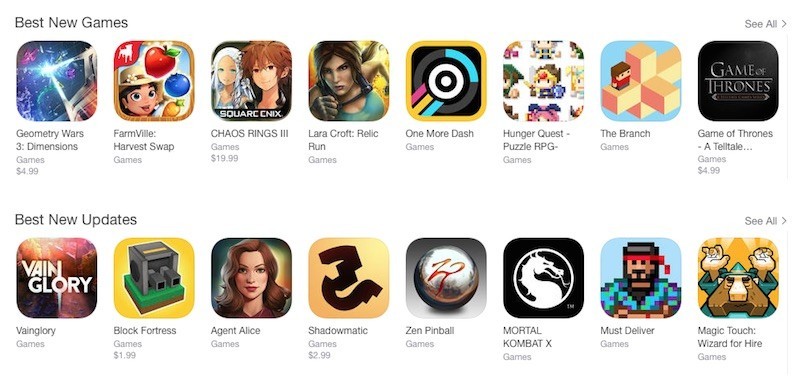Why the Apple App Store is Moving Toward a Curated Gaming Section
Apple quietly rolled out some changes in May that have significantly changed the way that the App Store’s game section works when it comes to game downloads. The App Store has moved towards human editorial content, and has done away with algorithmically generated sections such as “What’s New” when it comes to posting new games. While on the surface this seems like a step backward, it’s actually a smart move to reduce the number of developers who “game the system” (pardon the pun) with spammy titles.
While it would seem counter-intuitive, the App store developers found that game creators began titling their games with the letter “A”, even “AAA”, which made titles sound ridiculous, but allowed them to appear in sections where they were arranged alphabetically, such as the “What’s New” section. While it sounds ridiculous that people would buy titles that appear to be spam-generated, the process became increasingly widespread, due to the fact that many saw at least some profit in trying to fool Apple’s search engine into giving their titles higher ranking. This also led to the proliferation of clones and other problem games. In place of the original list-based setup, the App Store has developed a design not unlike that of the Google Store, using large banners for game titles as opposed to list-based designs.
Unfortunately, one immediate side effect for many developers was that the new design immediately reduced downloads. Some downloads dropped by anywhere from 30 percent to as much as 90 percent, as many games became much harder to find. The company predicts, however, that these reductions for games developed without spam techniques will be largely a temporary one, as app store users had to learn how to manage and navigate through the new App Store system. Makers of original titles and those who are working to produce and design more original and interesting games will eventually be curated through human editing and get the recognition that they deserve, if not even more so. But this is a time consuming process, and for many developers, will have an immediate effect on their visibility, and ultimately their revenues.
Switching from an algorithmic system to a human one has its drawbacks. Perhaps at least some original and quality titles may see a reduction in their downloads. There is also the risk of bias in reviewer selection. But the amount of spam and derivative content unfortunately has gotten too high, and Apple is making moves to do something about that. As with any business that works on the net, quality, original content always wins, so designers who are seriously invested in game design will succeed, and– due to the amount of work Apple is now putting into the App Store– likely sooner than later. In the end, the increased human interaction on Apple’s part means developers will have to work harder to make sure that their work meets Apple’s quality standards– and short cuts just won’t pass muster anymore.










